When Rockstar releases a new game, the media coverage follows a regular pattern. Much has been said about how the developer used its most recent match to innovate and rethink the open-world gaming genre. Almost always, an article describes how various episodes of American history influenced the development of Rockstar Games’ video games.
It’s nothing but a revolution on a PC gaming scene, just top-level online fun found at https://kamikajino.jp/slots/.
Furthermore, at least a few critics accuse the developer of breaching long-standing standards about what may and cannot be done in the framework of video games. The last type of article will inevitably conclude that video games are harmful and contribute to an increase in interpersonal violence as well as the breakdown of civilization.
Table of Contents
H2 What Is the Importance of the Historical Pattern?
The most essential point to note is how frequently it ignores Rockstar’s production and developing routines, the most famous being the company’s constant creation of games set in the past.
Keep track of how frequently it does this. In reality, if we remove the typical narrative that surrounds Rockstar games, which is linked to game mechanics, movies, and satire, we may see Rockstar as a publisher of historical games on par with other Tier-1 gaming studios:
- Assassin’s Creed (Ubisoft studio)
- Crusader Kings and Europa Universalis (in partnership with Paradox)
- Civilization (created along with Firaxis)
It is now common to read articles, podcasts, and videos denouncing those companies’ appropriation of the past. Yet, Rockstar has remained surprisingly unharmed, despite developing and publishing a series of games that, when combined, chronicle the contemporary history of the United States.
Here a few top viral games paired with real historical periods:
- Grand Theft Auto: San Andreas
- Red Dead Redemption
- Grand Theft Auto: Vice City
- L.A. Noire
- Red Dead Redemption 2
The Red Dead Redemptions’ Historical Fleur
Video games appear to be becoming more useful instructional aids in direct proportion to their increasing complexity. Tore Olsson, a history professor at the University of Tennessee in Knoxville, has started adding Red Dead Redemption games into his curriculum as teaching aids for students learning about American history between 1899 and 1911.
This professor is serious about using Rockstar’s westerns as tools, even though they include several historical errors, as GameSpot uncovered. The new course created by Olsson will be called “HIUS 383: Red Dead America.” Throughout the course, examples from Red Dead Redemption and Red Dead Redemption 2 were used to study various parts of American history that Rockstar Games highlighted particularly well.
Although the games usually include “historically incorrect” facts, Olsson admits they “deftly tackled several significant historical topics in 1899-1911.”
These issues include the following:
- Colonialism and the annihilation of indigenous peoples go hand in hand
- Jim Crow’s racist and segregation rule in the South
- Women’s suffrage and those who opposed it
- Pinkerton detective agency’s contribution to law enforcement privatization
Red Dead Redemption
Although video games are usually considered a form of pleasure, the effort to develop games like the Red Dead series may be recycled into essential tools that can be utilized in other aspects of life. This possibility remains, though, as video games seek to become more graphically realistic depictions of the times they aim to capture.
Although Rockstar hasn’t done much to repurpose its games to make them more teacher-friendly, Ubisoft’s Assassin’s Creed series has demonstrated that video games can be real-deal tools, just like those that can be found at https://kamikajino.jp/slots/.
Red Dead Redemption 2
There aren’t many individuals who would argue that Red Dead Redemption 2 boasts one of the best stories and fabulous RDR 2 characters, but they do exist. Certain things were predictable because it is a precursor to the first game in the series, but it didn’t make the experience any less breathtaking.
Focusing on this theme allows Rockstar to immerse a player in an exciting gaming situation while also allowing the developer to reflect on two of the more remarkable characteristics of current America:
- Hungry capitalism
- Gun violence
- Issues while following the spirit and the letter of the law
Although gun violence is evident in all of Rockstar’s historical games, it is worth taking a few seconds to analyze capitalism’s role in these games.
Grand Theft Auto: Vice City & L.A. Noire
Although the player’s viewpoint in Rockstar’s historical games differs from most history books, it corresponds to the preferences and issues shared in current American history. Sadly, as everyone who has lately been assaulted with midterm election campaign commercials knows, the image of GTA 5 characters, outsider candidates coming into town to clean up corrupt, entrenched systems is more than a literary cliche. As someone who has lately been exposed to such commercials, we can attest to this.
Furthermore, the long stories in L.A. Noire and San Andreas involving police violence and corruption look to be more relevant than ever. Rockstar’s history also shows America’s enduring disdain, if not outright scorn, for intellectuals and intellectualism, which is frequently a logical consequence of an anti-establishment viewpoint. This antagonism has a long history in America.
From this vantage point, Red Dead Redemption stands out due to the appearance of racist and drug-addled Yale professor Harold MacDougal. Yet, Vice City adds to this topic through the radio station Vice City Public Radio (VCPR), which attempts to mimic the philosophical issues handled on NPR. This is another manner in which Vice City is linked to this topic.
Final Words
Is it absurd to believe that historical material in Rockstar games may be used in a course since instructors frequently give historical texts and films to explain events? Given that certain historical content in Rockstar games has been successful while others have not. There is undoubtedly a basis for utilizing these games to study many key events in American history, such as the closing of the frontier, the country’s industrialization, the postwar boom, the drug war, and the twentieth-century racial and ethnic conflicts.








Leave a Reply